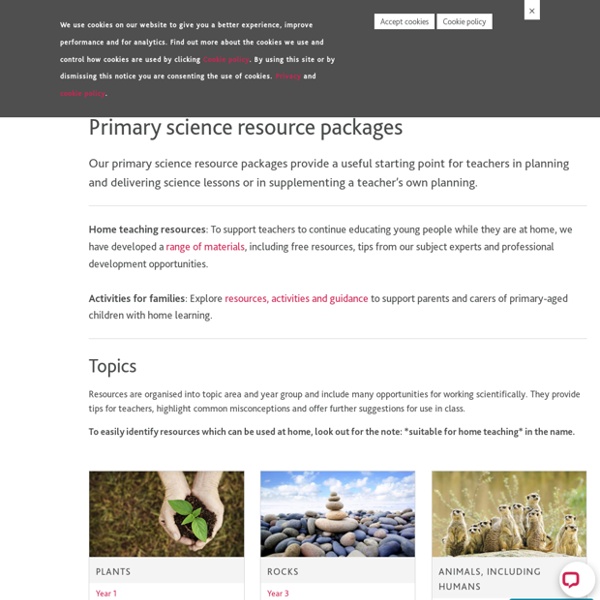



https://www.stem.org.uk/primary-science
Related: Resources - Science and Technology • Investigation sitesSqueeze-Bottle Straw Rockets - The Lab It’s easy to turn a juice bottle into a rocket launcher. How? Grab a few straws, some modeling clay, and an empty juice bottle to make a launcher that will send the straw rocket soaring across the room. Okay, you’ll learn something about Newton’s Laws of Motion at the same time. How Does It Work While you’re having fun launching straws, you’re actually learning about Newton’s Laws of Motion. Make a ghost glove Make a 'ghost glove' by mixing and splitting carbonic acid! This crazy experiment adapted from the Nat Geo Kids book Try This! is guaranteed to get you excited about chemical reactions.
Primary Science Teaching Trust Click here for a downloadable PDF version of this overview. Click here for a downloadable PDF version of this overview in Welsh. Click here for the supporting teacher notes giving short descriptions of the science behind each video, plus some top tips. Click here for these supporting teacher notes in Welsh. Primary Science Assessment (PLAN) The PLAN primary science assessment resources – www.planassessment.com – have been produced to help schools plan and assess effectively the science National Curriculum (England). Most of the resources are free to download from the PLAN website. Some (see documents below) are currently only available to ASE members. The CPD resources are available for sale on the PLAN website. The PLAN primary science assessment resources include:
Here Is A Great Website for STEM Teachers and Students May 1, 2016 NOVA, one of the popular American TV series that produces in-depth science programming in the form of documentaries and short videos, has this excellent resource called NOVA Education. This is a free portal designed specifically to cater to the teaching and learning needs of STEM teachers and students. It provides a wide variety of educational materials that include informative short-form videos explaining different scientific phenomena, lesson plans to appropriate for your own teaching situation, interactive and several other resources all aligned to teaching standards. You can use the site’s search box to quickly locate a video or browse through the content of NOVA Education by topic. There are four main topics: Life Science, Earth and Space Science, Physical science, Technology and Engineering. Each of these topics includes a number of subtopics.
WowScience - Science games and activities for kids Psychologists recognise that the story format gets a different kind of attention in our brain – it is ‘psychologically privileged’. Our minds tend to look for cause and effect and even if the information is not presented as cause and effect, we tend to remember things in this way, in this order. Other important factors that our brains listen out for are conflict and characters and complications: we wonder with whom should we empathise in the story and how do they cope with difficult events? So, how can we use this in the classroom? Stories about scientists History is an obvious candidate for teaching through stories as the content is largely cause and effect and there is often an emotional content to a historical story too, which engages the reader/listener.
Year 3: Rocks Category:Earth science This is a treasure chest of ideas for teaching about fossils, containing ideas for use in class or for an inset activity to help teachers prepare for this new topic. looking at fossils of plants and animals may help children see that fossils are not 'bits of bones' but were once living creatures. Science Fair Project Display Boards Please ensure you have JavaScript enabled in your browser. If you leave JavaScript disabled, you will only access a portion of the content we are providing. <a href="/science-fair-projects/javascript_help.php">Here's how.</a> Key Info
15+ STEM Lessons and Activities to Teach Chemical Reactions By Amy Cowen on August 20, 2020 8:00 AM Use these free STEM lesson plans and activities to teach and explore chemical reactions with K-12 students. The best way to teach chemical reactions is to show them in action or, when possible, let students get hands-on with exploring the reactions. If you are planning to teach a unit on chemical reactions, you might find just what you need in one the 15+ free STEM lessons and activities listed below. Lesson Plans contain materials to support educators leading hands-on STEM learning with students. Lesson Plans offer NGSS alignment, contain background materials to inspire confidence in teachers even in areas that may be new to them, and include supplemental resources like worksheets, videos, discussion questions, and assessment materials.